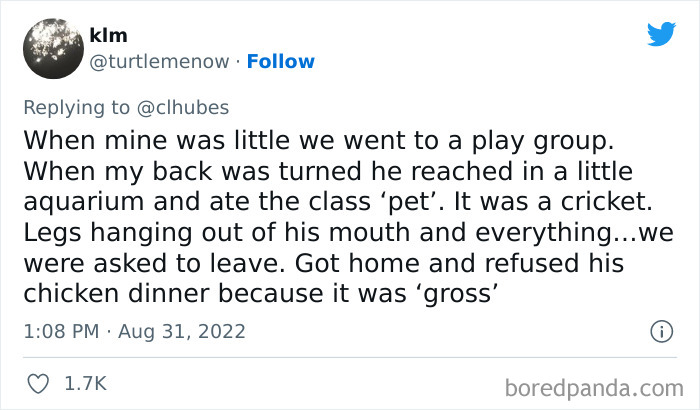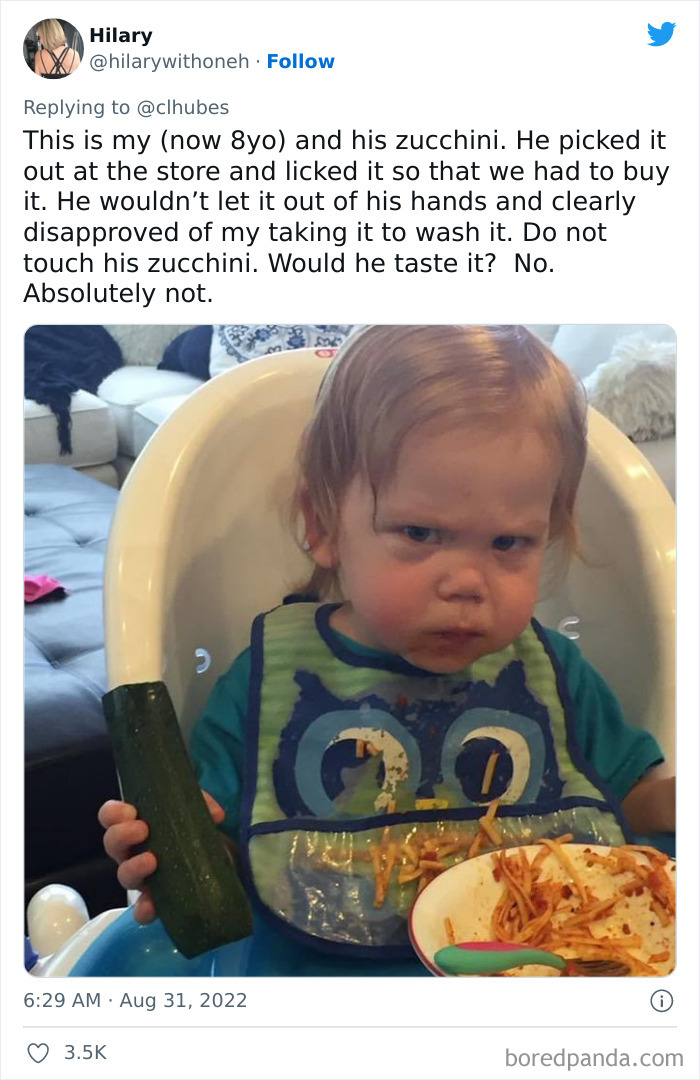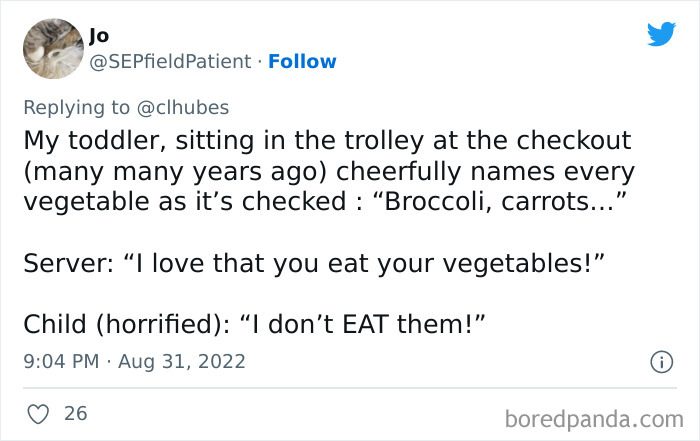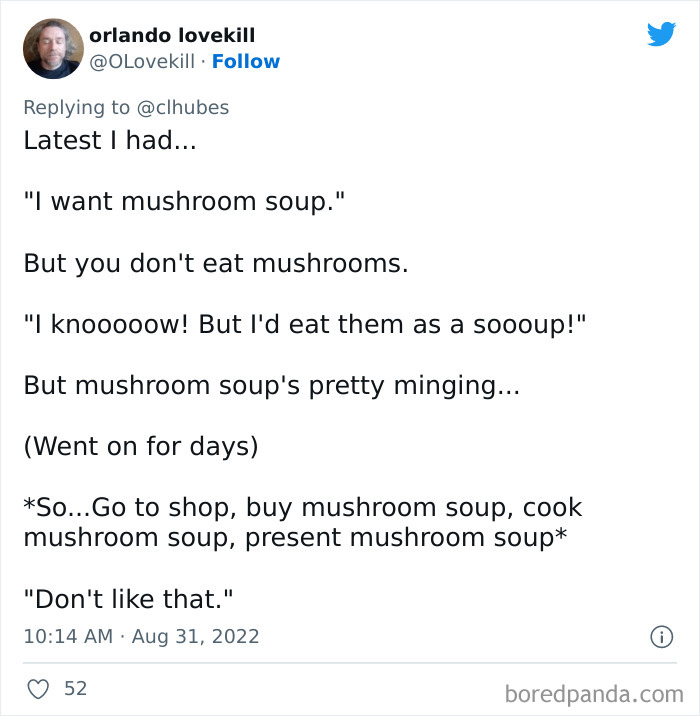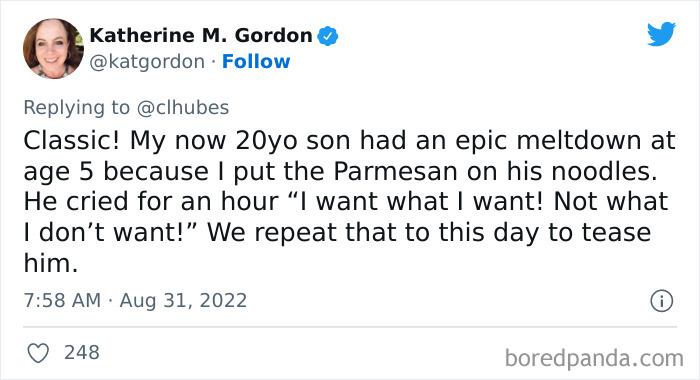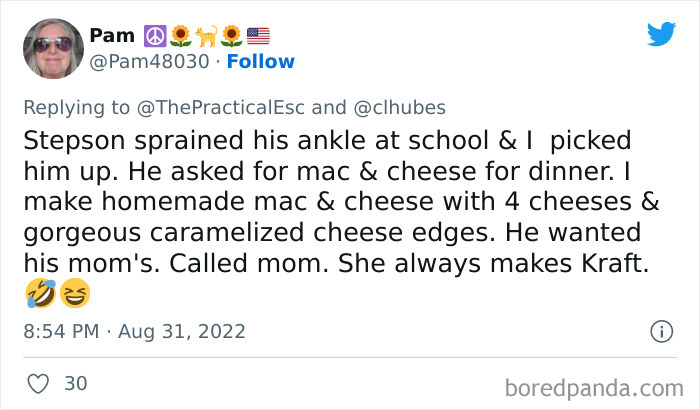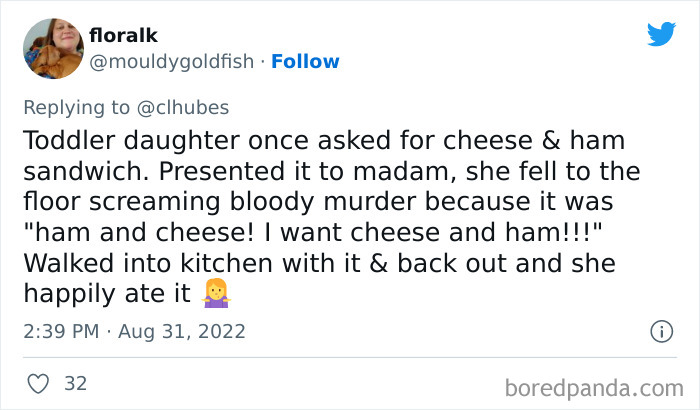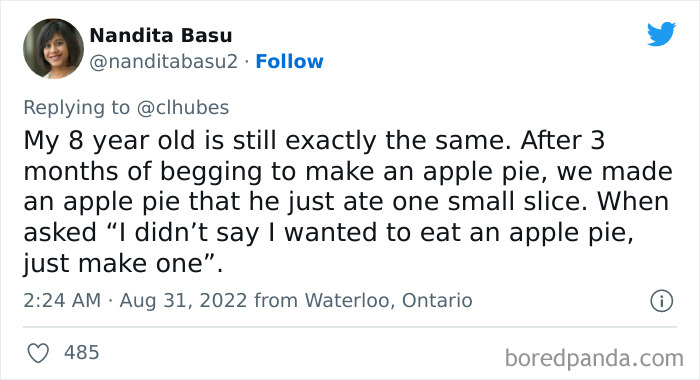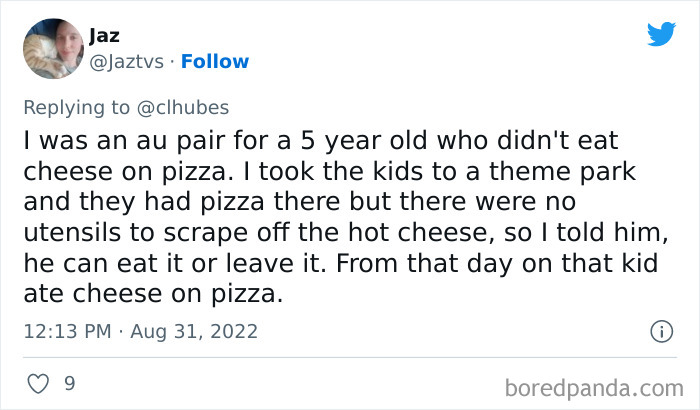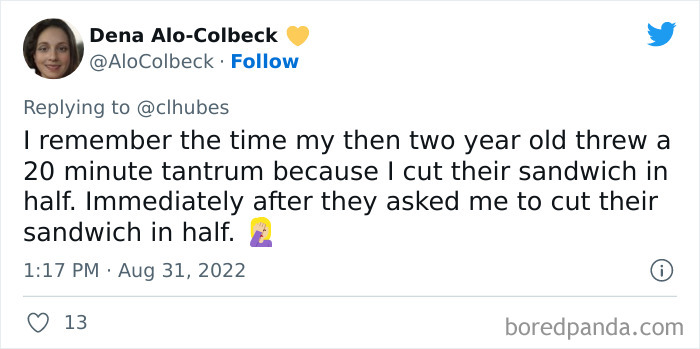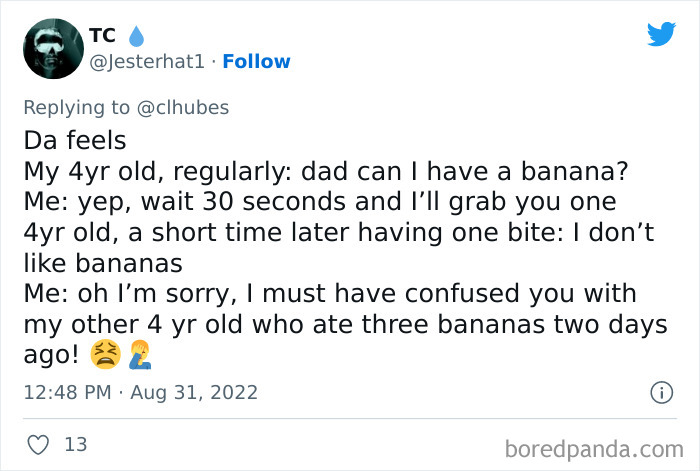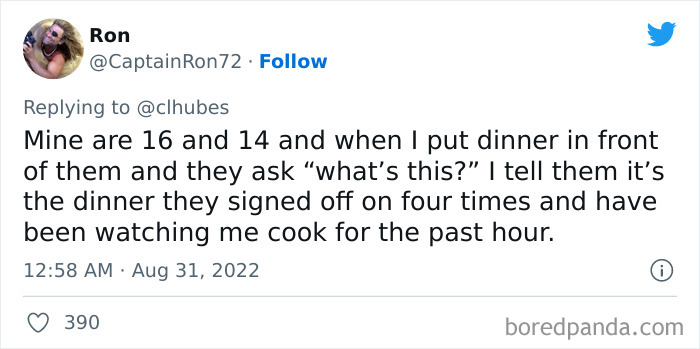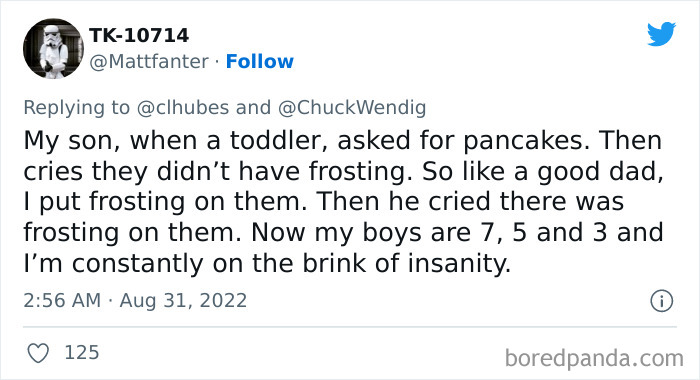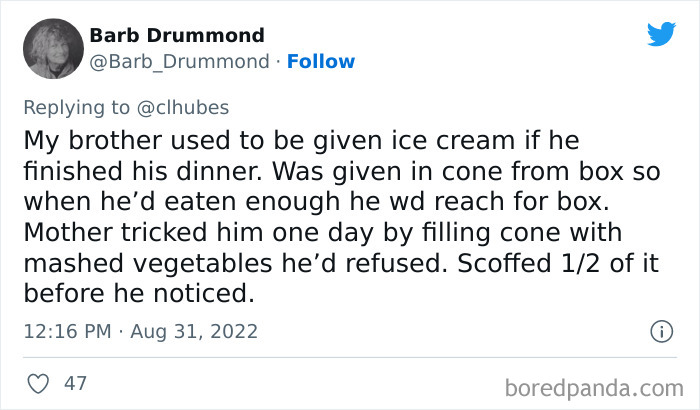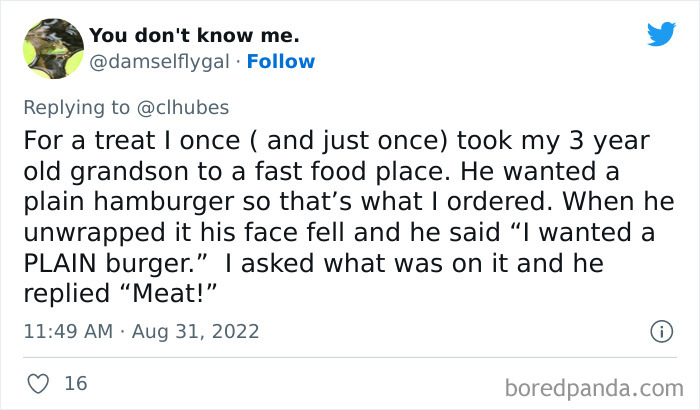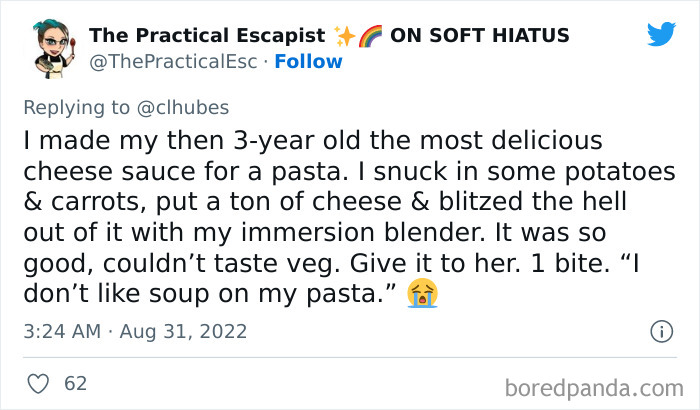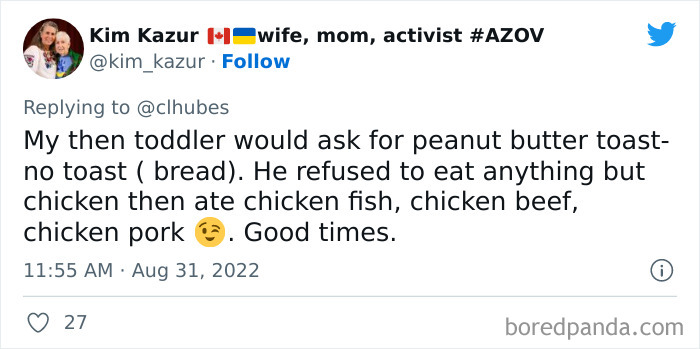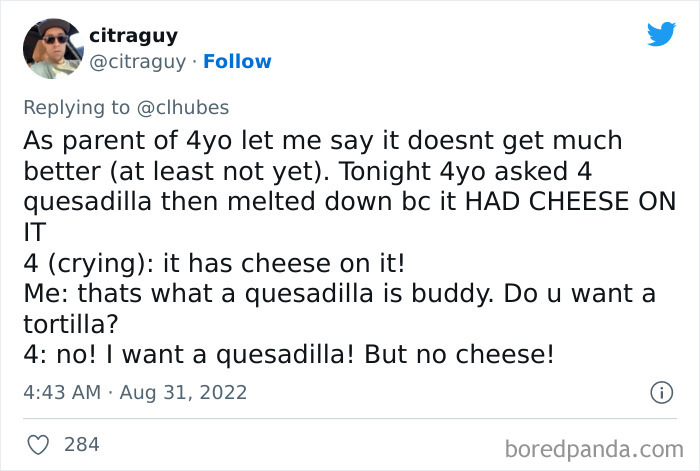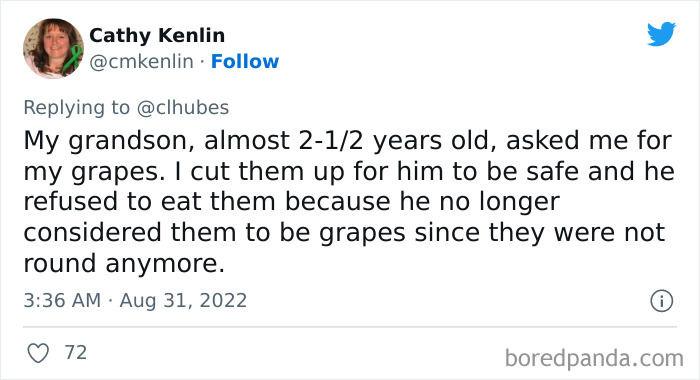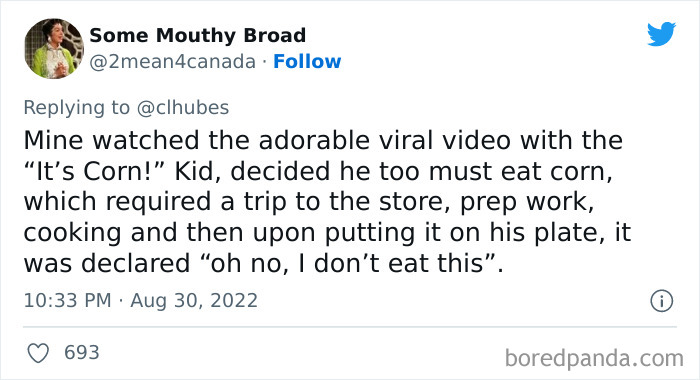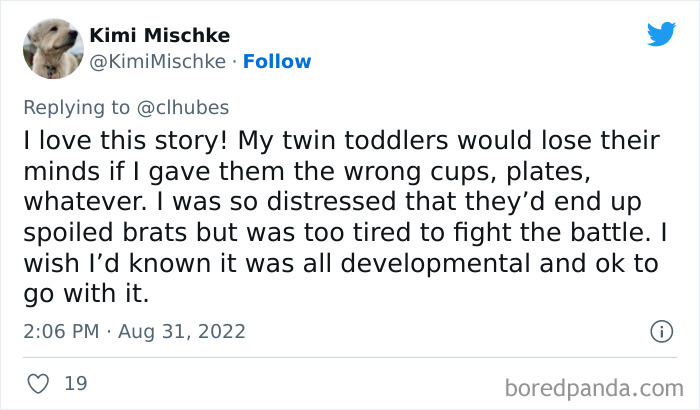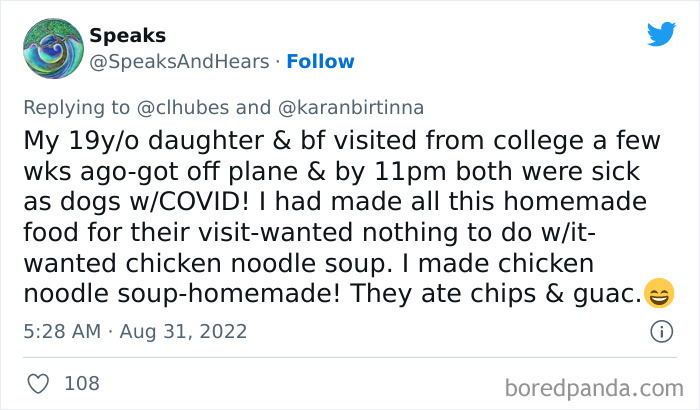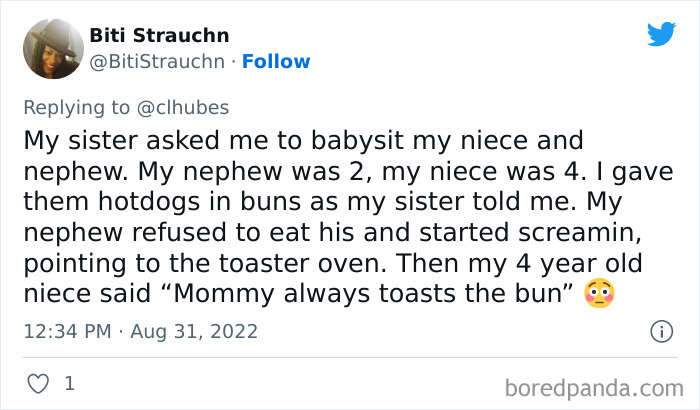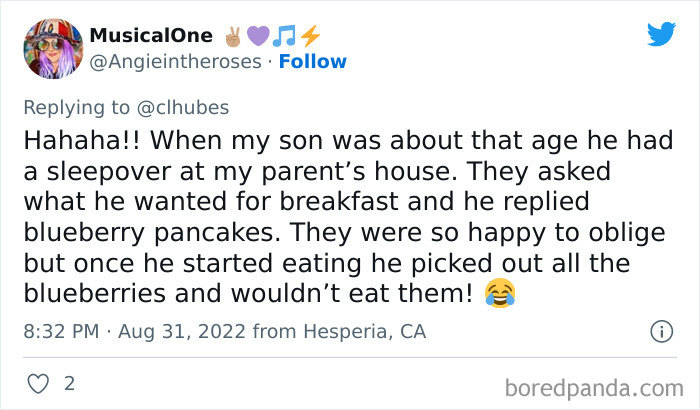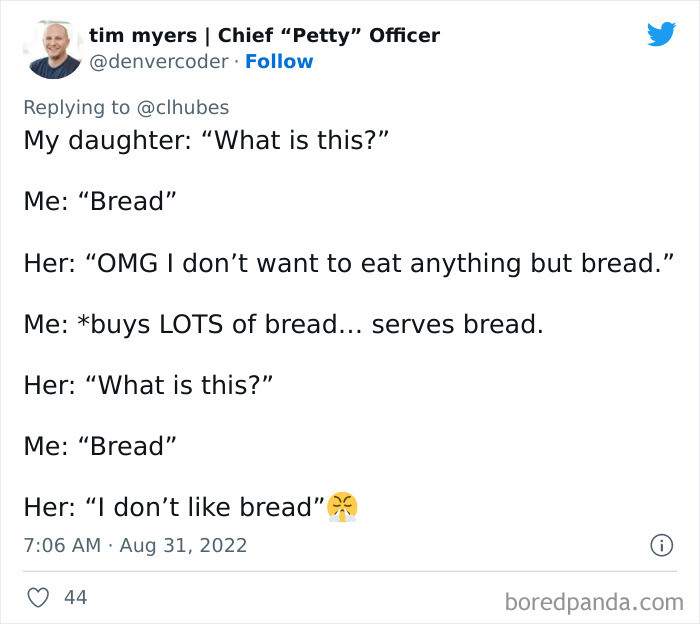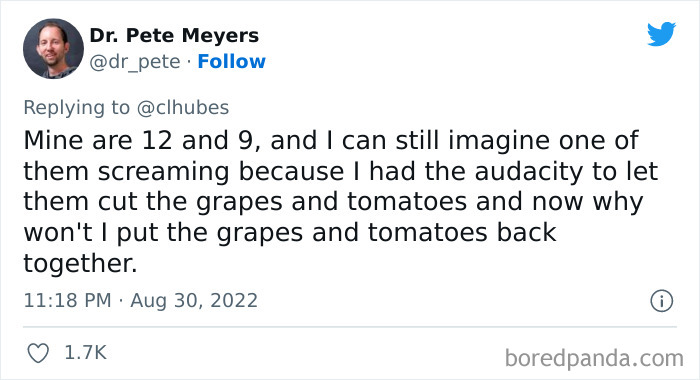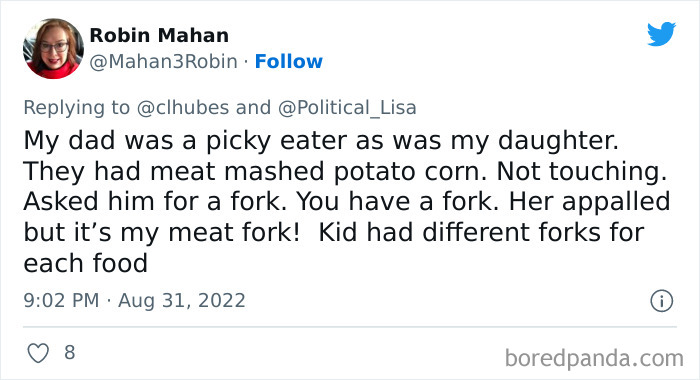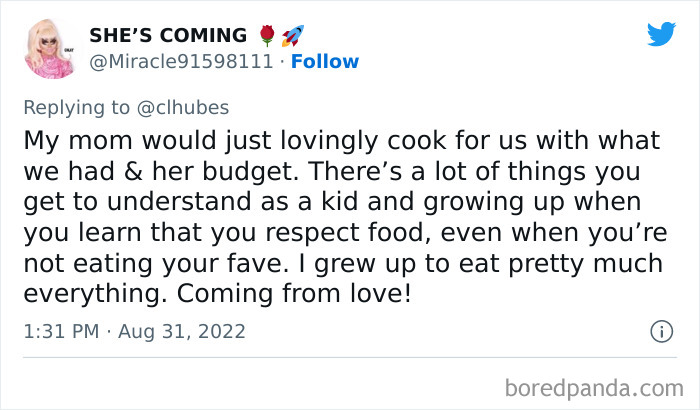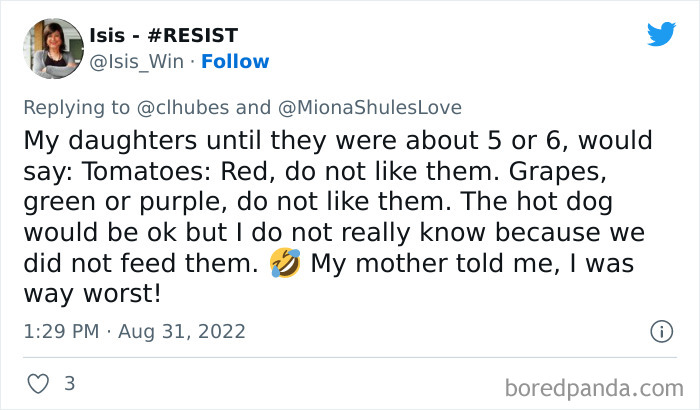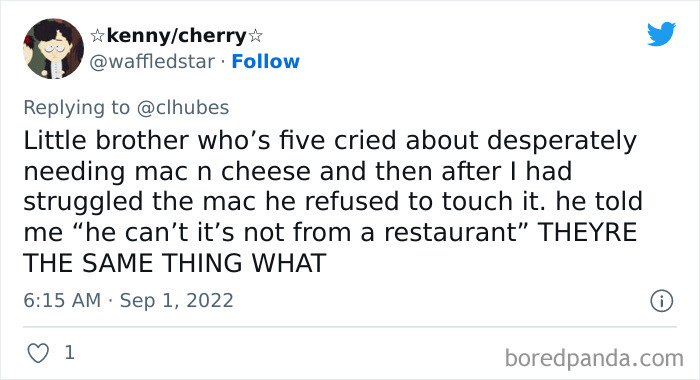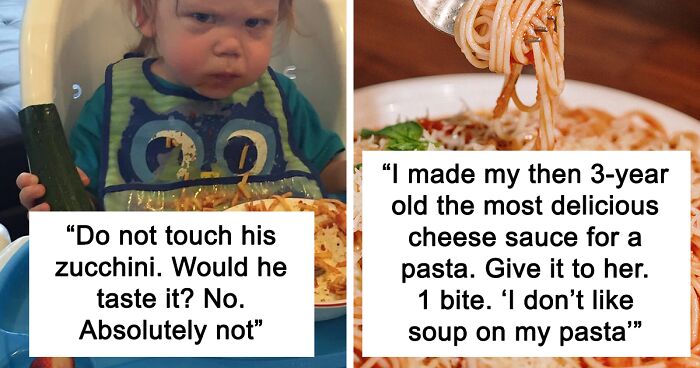
35 Times Stubborn Kids Proved That Their Parents Can’t Make Them Eat Anything They Don’t Want To
Here comes the soup train! Chugga chugga chugga chugga choo choo!
These aren’t regular slices of cucumber, they’re stars! Much more exciting than boring old circles, and they taste better. See?
No, no, that’s not spinach! It’s just some green food coloring because I know green is your favorite color!
If you’re a parent, you know the struggles that can come along with trying to convince a picky eater to try even one bite of the meal you so lovingly prepared. But sometimes the frustrating task of trying to get kids to eat is hindered less by pickiness and more by confusing or unrealistic expectations. Writer Lucy Huber recently tweeted about an experience she had with her two-year-old where he called all the shots when preparing dinner then somehow still refused to eat it…
Lucy’s tweet inspired dozens of other parents to share similar stories of when trying to get their kids to eat made them want to rip their hair out, so we’ve gathered the most hilarious ones down below, as well as an interview with Sarah Remmer's lead counselling dietician Lesley Langille, MS, RD. Be sure to upvote all the tweets that you find painfully relatable, whether you’re a parent, you’ve worked with kids, or you remember being the same way as a child, and then let us know in the comments if you have any personal stories to share proving that we can’t ever get kids to eat anything they don’t want to. And then if you’re interested in reading another article from Bored Panda featuring creative reasons kids have come up with for refusing food, check out this hilarious story next.
After this mom tweeted about her recent struggle getting her two-year-old to eat dinner, she inspired dozens of other parents to share similar stories


This post may include affiliate links.
When I turned 5, my favorite film was The Wizard of Oz. I was obsessed with Dorothy and watched the movie on VHS every day. So for my birthday, my parents pulled out all the stops and got me a ruby red slipper cake. It was shaped like the famous shoes from the film, which I of course also had a pair of that I refused to take off, and was covered in red glittery frosting. After taking one bite, however, I had an absolute meltdown because I didn’t like the taste of the icing. I’m not sure if red food coloring actually has a strong taste or if it was all in my head, but looking back on that experience makes me cringe. I imagine that my parents had to use all their energy to stop themselves from smashing my face into the beautiful cake.
Preparing food for children can be a painful experience. What they devoured yesterday and said they wanted to eat every single day for the rest of their lives might be deemed disgusting today. The bread has to be cut exactly the right way, the butter has to be the perfect temperature because if it melts and can’t be seen it might as well have disappeared, the fruit can’t be ugly, and if the apple starts to turn brown several minutes after being cut, you might as well throw it in the trash. Kids’ preferences can change rapidly, but one thing is for sure: their preferences are powerful.
If you have children, I’m sure you are familiar with the frustrating experience of finding the perfect recipe for dinner, getting it pre-approved by your little ones, having them help out in the kitchen, and then when it comes time to sit down for dinner, your kids refuse to try even one bite. I don’t have children of my own, but I have worked with many and lived with two as an au pair, and let me tell you: meal times could be incredibly stressful.
Sometimes kids just don’t know what they want. Whether they ask for a certain vegetable that they did not realize is green or they saw a food on a cartoon and requested it without realizing the real-life version could never live up to their expectations, children have no problem refusing foods. Picky eating is common among kids, as the unknown can be scary and if they are not introduced to certain foods early on they can seem unappealing, but the stories on this list are even funnier than outright denying a particular food. These kids got their parents’ hopes up only to squash them and leave them with a pot full of mushroom soup leftovers to eat the rest of the week.
I have seen this happen many times with the children I have babysat and au paired for as well. “Mom, I really want broccoli!” He then would proceed to eat one nibble off the top of a piece. And honestly, calling it a nibble is being generous. “Adelaide, can you make me a cheese sandwich?” I would then present what I would consider a stunning sandwich only to be met with, “No! It’s UGLY! Throw it in the trash and make another!” Having kids is certainly no walk in the park.
To gain some insight from an expert on why it can be so challenging to get kids to eat sometimes, we reached out to Sarah Remmer's lead counselling dietician, Lesley Langille, MS, RD. "Feeding kids is tough," Lesley told Bored Panda. "The foods they love on Tuesday can equally go untouched on Thursday. As a pediatric dietitian, I am not immune to the challenges of picky eating. I have two very different eaters although they were offered the same foods and same mealtime rules. I think what’s important to remember is that as a parent it’s not actually my job to get my kids to eat. Whether my kids eat (and how much they eat) is completely up to them!"
"The method of feeding kids we teach within the counselling practice (The Centre for Family Nutrition) and use in feeding our own kids is called Ellyn Satter’s Division of Responsibility (sDOR)," Lesley shared. "This feeding approach is built on loving boundaries. Kids thrive on structure, but they also need to develop the ability to become independent and to learn competence (and confidence) in eating. According to the sDOR, parents are responsible for the feeding environment, regulating timing of meals and snacks, and deciding what foods to purchase, prepare and offer," Lesley explained. "Kids on the other hand, are responsible for if and how much they eat! Which is completely different from the way we were often fed! No more 'take a bite' or 'finish your plate' mentality. If your kid is requesting a specific meal or snack, I think it’s okay to offer, remembering that what foods are offered in your household are ultimately your choice. If they decide that they don’t want to eat what they requested that’s okay too. As frustrating as it is, remind yourself that your job in the feeding relationship is done once food has been offered."
We were also curious if picky eating is something parents should be concerned about or if it's usually a passing phase. "Picky eating is something every parent will eventually experience," Lesley says. "At around age two-years we tend to see picky eating habits increase as this is when, developmentally, kids become a bit more independent and start to understand and assign fear. That safe and familiar food that they used to love might become a bit scarier with green spots or a burnt edge. Or they might get frustrated with spooning their own yogurt and not eat as much."
"What we need to do as parents is to keep practicing the sDOR and let our kids learn," Lesley told Bored Panda. "The more kids practice eating and exploring foods the more their confidence grows. It’s this confidence that helps kids break through the picky eating phases. However, for some kids picky eating can be extreme and require intervention from a dietitian. If your child has developed food anxiety or eats fewer than 2-3 foods per food group, I would recommend seeking help from a pediatric dietitian."
for some reason, i found their profile picture very distracting… my brain refused to read the word pineapple and just replaced it with pumpkin… :l
When it comes to her tips for getting picky kids eating more, Lesley told Bored Panda, "Motivation to eat really needs to be internal (I want to eat) versus external (please eat your veggies). One of the best things you can do to help a stubborn eater gain the motivation is to ask for their help! Help in the kitchen such as washing veggies or mixing ingredients will allow your stubborn eater to explore food in a pressure-free way. The bonus is that kids who have a hand in the food being made are more likely to consume it. Kids can also help decide their food choices with a structured choice – for example, would you like an apple or banana with your cookie. This helps kids gain confidence and feel like they have a voice in their own consumption."
"As a mom to a stubborn eater, I would say my biggest tip would be to remain calm," Lesley shared. "When kids reject food, it can be frustrating and the desire to scream 'just eat it' can bubble to the surface. I get it. But that one-bite of broccoli mixed with toddler tears is not going to add a whole lot of nutritional value. What’s more important is that kids learn to explore food at their own pace and that as parents we help create the opportunities for them to do so."
I work with kids with behavioral problems as my job. You did wonderfully OP. Exactly why your own kids don’t have behavioral problems.
Lastly, Lesley shared, "What I love about the sDOR is that it is built on trust – my kids are trusting me to provide them with everything they need to grow and thrive, while at the same time learning to trust what their bodies are telling them. This is what helps them develop a healthy and long-term relationship with food – which is the ultimate wish for my kids."
If you're interested in gaining more expertise from Lesley, you can check out Sarah Remmer's website right here and her Instagram right here.
The thing is, it can be impossible to get kids to do things they don’t want to do. Regardless of how impressionable they may be, they can also be incredibly stubborn. And considering that children’s personalities really start showing between the ages of 3 and 5, if they have made their minds up about a certain food or meal, it can be extremely hard to change it. You might be thinking that a kid will always eat a food if they help with the preparation because they want to enjoy the fruits of their labor, but sadly, it’s not that easy.
As Lucy’s tweet goes to show, being involved can mean nothing to a child. And I can vouch with personal stories as well. I have helped a child prepare a salad that he was thrilled to make, as he chose all of the ingredients and cut them up while I supervised, and he still wanted no part in eating it. His job was to make it and serve it to others, apparently. And it does not only happen with vegetables. This same child would request that we make cupcakes, brownies and pies and then proceed to ask for ice cream or the cookies from the store instead while everyone else was trying his creation. Kids can be impossible to understand.
Kids may have incredible imaginations and a sense of logic that adults cannot always comprehend, but as many of the replies to Lucy’s tweet pointed out, kids are not the only ones who change their minds. It is a common experience to go to the store, buy a mountain of groceries, and then not be able to decide what to make for dinner because nothing in the fridge sounds good. Or sometimes, we go so far as preparing an entire meal before we realize that it’s just not going to hit the spot tonight. The only difference is, when I do that, I will still eat it because to me, as an adult, one meal is not the end of the world. I’ll eat something I’m really craving for my next meal. For a child, however, it may be impossible to see past the hour that they must spend at the dinner table. So if the food is not appealing, they might just choose to skip eating altogether.
You’re lucky she didn’t DESTROY your cell phone. I was once asked to babysit my five-year-old cousins, and one little boy decided to throw my phone on the ground, stomp on it multiple times, whack it on the table, and show the horrible mess to his sister smugly. Just because I told him he couldn’t drink soda, OR eat ice cream, OR eat chips, or any junk food. Plus, he pushed the fruit bowl and healthy snacks I’d made them onto the floor, run around like lunatics, and proceed to whack me with their plastic toys. Yup, I guess I failed as heck as their babysitters, because I’ve personally never been chased around screaming by two five-year-olds with plastic toy trucks. Now I understand why their parents (my nice Aunty Sabina) needed a break… and they were surprised to see me pretty much still alive when they FINALLY showed up five hours later.
Are you sure he knows it’s a sweet potato not a meat potato aka cute hamster? :) (joking)
When it comes to whether picky eaters are caused by nature or nurture, parents have mixed opinions. One parent of an 18-month-old told Family Education, “They're born. We have struggled so much to get this kid to eat. He loves noodles and sweet things, but he likes them better on my plate than on his. He loved American cheese slices for a few days; now he won't touch them. It's not what we're doing, it's that he just keeps changing." When a kid who is so young has already refused a variety of foods and changed his mind many times about what he likes, I can’t help but think that they are born. On the other hand, another parent of a four-year-old says, “They're made. We've never made special meals for him, always insisted that he try new foods, and as a result he eats everything. He loves fruits and vegetables." Who's going to tell her that she probably just got very lucky or his picky eating phase has not come yet?
One mother of a five-year-old and a three-year-old told Family Education that picky eating can be caused by nature and nurture. “It's personality, temperament. They're born that way and it just gets made worse, or not. When Michaela was a baby she would eat everything, then at two she wouldn't, and now she's starting to branch out again. Lily has always been more particular. She looks at a food first, asks a lot of questions before she'll try it." Whatever the reason behind it, the important thing is that the kid eats something. Even if it feels like they are being spoiled at times or if giving in and letting them have a sandwich instead of the lasagna you prepared feels like a failure, it is likely they will grow out of it anyway. As a kid, I assumed I did not like many vegetables or foods I had not been exposed to many times, so I kept avoiding them out of habit. But something shifted when I went to college and became an adult and decided I was going to be open to trying everything. Turns out, I like all vegetables and basically everything else too, as long as it’s plant-based. I am not picky at all anymore, but my parents would have never guessed that considering all of the years I spent eating chicken quesadillas and peanut butter and jelly sandwiches.
Amazing isn't it what happens when a child is told they don't have to eat it. It's their choice, but the choice is between 'take it' or 'leave it'.
If you’re in need of some tips to get your picky little ones to expand their palettes, Katie of the Good Life Eats blog recommends focusing on making foods more fun. She explains that using color can be a great way to get in a variety of nutrients, as well as appealing to more than one of a kid’s senses. Setting out a platter of tomatoes, oranges, yellow bell peppers, cucumber, blueberries, and purple cauliflower might be more inviting to a kid who wants to “taste the rainbow” than being presented one of these foods at a time. It can also help to use cookie cutters to make vegetables, cheese, meats or tofu into interesting shapes, so kids can play with their food as they eat it. Dino nuggets and alphabet pasta have long been favorites of picky eaters, but the same concept can be applied to a variety of foods!
How do you measure things if he eats all the bananas?, or, as a kid I knew called them, "nabanas".
Whelp guess I'm not eating for the day and off to bed without food.
On her blog, Katie also recommends appealing to your child’s specific interests when preparing food for them. For example, her son loves geography, so she convinced him to try Canadian bacon by focusing on the Canada aspect. This can be a great way to get kids to try foods they have seen in their favorite films or meals from different cultures as well. They don’t have to love it immediately, but if they have a reason to be excited about it, they might be more inclined to take a bite. Even using fun names for foods that kids may be less interested in can help. For example, a green smoothie can be “monster juice” and broccoli can be “baby trees”, Katie explains. Whatever you can do to pique your child’s interest, it will be worth it when you get through meal time without a meltdown.
My daughter (about 2 or 3 at the time) asked what the brown spot on her banana was. I told her it was just a bruise. She then kissed the banana's boo-boo.
Just reading this is making my blood pressure go up. Thank you, BP, of curing my weird case of low blood pressure I had for three years. -_-
Finding new ways to serve foods can help kids become interested as well. For example, fruit on a plate might not be touched, but if a child gets to eat fruit off a stick, they might be more willing to try it and eat all of the pieces, rather than grabbing one at a time off a plate. And although none of these tips are full-proof, some parents also recommend involving your kids in menu planning. Ask them a few days before what they would like to eat that week and present them with options. Then remind them every day what is on the menu for the week, so they are prepared and there are no surprises. You can show them photos of what you are making if they are curious, but use discretion, as this can also backfire if your presentation is not exactly the same as what they have seen.
5 year old, "We had chicken made from sheep for dinner." was the first clue we fed him chicken too often.
At the end of the day, you never know exactly how a child will react to being presented with a new food, or even an old food that they loved the day before! We hope you’re getting a kick out of this list whether you are an exhausted parent tired of begging your toddler to eat or you don’t have kids and you have absolutely no plans of having any after reading these tweets. Keep upvoting your favorite posts, and then let us know in the comments if you have any experience with extremely fickle eaters.
I totally get this... I want a quesadilla too, but not the calories in it.
My 31 year old wife did this. We bought sweets, she ate her sweets. She then got sad because she didn't have any sweets!
I understand feeling ill, but the last bit seems very ungrateful of daughter and her boyfriend.
I hope they mean when the kids were very little and not, like, yesterday
yeah we grew up eating what was served or went hungry. when my mom became a nana she also suddenly became a short order cook to please the grandchildren :)
Dry mouth agony satisfied! All that was needed! That's why I always have water by my bedside.
No offence to anyone, but this whole thread is one of the many reasons I don't want kids
Yeah, but we have childfree spaces for stuff like that. These stories make my ovaries eat themselves, too, but we hate it when parents interrupt childfree conversations with "You're so cold, my kids are the greatest thing!" and that s**t, so let's not do it here. There are a couple discussions underway in other threads for us.
Load More Replies...Alright guys, I’ll probably get downvoted but most of these problems are the fault of the OPs. If the kid refuses to eat it after they demanded it, they’ll eat it when they get hungry, or at lease some of it. It’s not child cruelty to teach them the consequences of their actions or to let them get hungry. The kid is gonna eat some time.
But there ARE foods I don't like, and refuse to eat. I'm sure you are the same. Why should we assume a child is just being stubborn for not liking something? If they try it a few times and don't like it, then that's ok. If they like very little apart from Mac n cheese, then it could be parenting.
Load More Replies...What on earth are parents doing giving in to tantrums and such c**p?! We are not short-order cooks. Give the children good wholesome food that's going to enable them to grow strong and healthy. Don't make them eat food they utterly hate, but also don't allow them to be tyrants.
Tried that. Ended up with underweight kids. Don't judge. Eat or be hungry? Mine pick hungry.
Load More Replies...No offence to anyone, but this whole thread is one of the many reasons I don't want kids
Yeah, but we have childfree spaces for stuff like that. These stories make my ovaries eat themselves, too, but we hate it when parents interrupt childfree conversations with "You're so cold, my kids are the greatest thing!" and that s**t, so let's not do it here. There are a couple discussions underway in other threads for us.
Load More Replies...Alright guys, I’ll probably get downvoted but most of these problems are the fault of the OPs. If the kid refuses to eat it after they demanded it, they’ll eat it when they get hungry, or at lease some of it. It’s not child cruelty to teach them the consequences of their actions or to let them get hungry. The kid is gonna eat some time.
But there ARE foods I don't like, and refuse to eat. I'm sure you are the same. Why should we assume a child is just being stubborn for not liking something? If they try it a few times and don't like it, then that's ok. If they like very little apart from Mac n cheese, then it could be parenting.
Load More Replies...What on earth are parents doing giving in to tantrums and such c**p?! We are not short-order cooks. Give the children good wholesome food that's going to enable them to grow strong and healthy. Don't make them eat food they utterly hate, but also don't allow them to be tyrants.
Tried that. Ended up with underweight kids. Don't judge. Eat or be hungry? Mine pick hungry.
Load More Replies...
 Dark Mode
Dark Mode 

 No fees, cancel anytime
No fees, cancel anytime 






